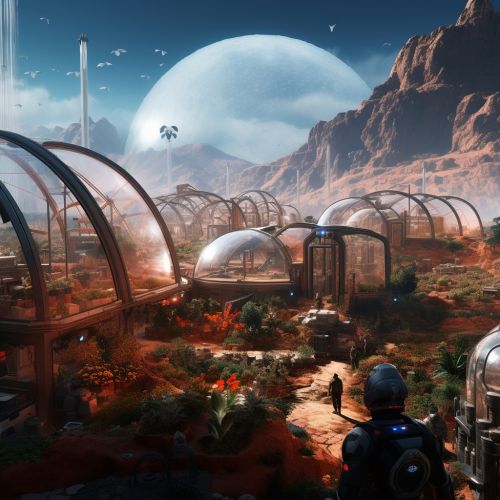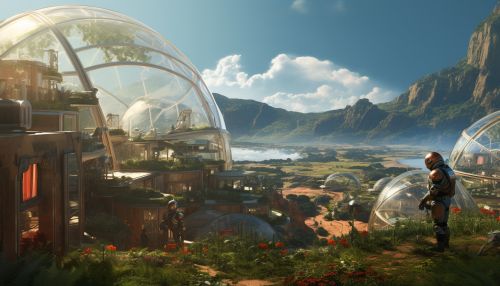Mars colonization
Introduction
Mars colonization refers to the hypothetical human habitation and exploitation of the planet Mars. The concept of colonizing Mars has been a staple of science fiction, and has received serious attention from scientists, engineers, and entrepreneurs in the 21st century.
Motivations for Mars Colonization
There are several motivations for Mars colonization, including scientific research, the long-term survival of humanity, and the expansion of human civilization beyond Earth. The colonization of Mars could also serve as a stepping stone for the exploration of the outer solar system and beyond.
Scientific Research
The colonization of Mars would provide opportunities for a wide range of scientific research. These include studies of Mars' geology, climate, and potential for life, as well as the effects of long-term space habitation on the human body.
Survival of Humanity
Some proponents of Mars colonization argue that it would help ensure the long-term survival of humanity. They suggest that a self-sustaining colony on Mars would serve as a "lifeboat" in the event of a catastrophic event on Earth, such as a nuclear war or asteroid impact.
Expansion of Human Civilization
Others argue that Mars colonization is the next logical step in the expansion of human civilization. They suggest that the colonization of Mars would provide opportunities for economic growth, technological innovation, and the development of new social and political systems.
Challenges of Mars Colonization
Colonizing Mars would present a number of significant challenges. These include the harsh Martian environment, the technical difficulties of transporting humans and cargo to Mars, and the need to develop self-sustaining systems for life support, food production, and energy generation.
Martian Environment
The Martian environment is inhospitable to humans. The atmosphere is thin and composed mostly of carbon dioxide, with temperatures averaging -80 degrees Fahrenheit. Mars also has a weak magnetic field, which means that the surface is exposed to higher levels of radiation than on Earth.
Transportation
Transporting humans and cargo to Mars would require significant advances in space travel technology. Current spacecraft are not capable of carrying large payloads to Mars, and the journey would take several months with current propulsion technology.
Life Support and Sustainability
A Mars colony would need to be largely self-sustaining. This would require the development of systems for life support, food production, and energy generation. Life support systems would need to provide air, water, and waste disposal, while food production systems would need to be capable of growing food in the Martian soil or in controlled environments. Energy generation systems would need to be capable of harnessing solar power or other sources of energy.
Current Efforts towards Mars Colonization
Several organizations and companies are currently working towards the goal of Mars colonization. These include NASA, SpaceX, and the Mars Society.
NASA
NASA has been studying Mars for several decades, and has sent a number of robotic missions to the planet. NASA's current plans for human exploration of Mars involve the use of the Orion spacecraft and the Space Launch System, a heavy-lift rocket.
SpaceX
SpaceX, a private spaceflight company founded by Elon Musk, has announced plans to send humans to Mars as early as 2024. SpaceX's plans involve the use of the Starship, a fully reusable spacecraft currently under development.
Mars Society
The Mars Society is a non-profit organization dedicated to promoting the exploration and colonization of Mars. The Mars Society conducts research and advocacy work, and operates the Mars Desert Research Station, a simulated Mars habitat in Utah.
Conclusion
While the colonization of Mars presents significant challenges, it also offers opportunities for scientific research, the survival of humanity, and the expansion of human civilization. With ongoing efforts from organizations like NASA, SpaceX, and the Mars Society, the dream of colonizing Mars may become a reality in the not-too-distant future.


